There are signs abroad that the greatest of the social
phenomena of our age, the steady movement of the surplus population of Europe across the seas, is likely to receive a check. The reluctance to receive more immigrants is not con- fined to the Chinese. The Australian workmen already ask that immigration even from Europe shall be discouraged, as tending to reduce the rate of wages ; and the Americans begin to protest that their institutions cannot be worked if the number of foreign-born citizens is allowed to increase. The Canadians declare this very week that the practice of "dumping down" European paupers in the Dominion must cease, and that only agriculturists ought to be admitted ; and everywhere the idea of picking and choosing among the offered supplies of labour begins to become dominant. Nothing very strong has been done as yet ; but as the pressure grows more severe, it is more than probable that immigration will be prohibited in almost all countries,—or, rather, reduced to a minimum by burdensome taxation. The effect of this change will be to compel the countries of Europe to provide for their own poor, and to retain at home those who are at once energetic and discontented, thus intensifying rapidly all the social problems. According to the old economists, the increasing pressure ought to check marriage, and therefore the growth of population ; but it is by no means certain that this is the result. Some very poor populations, notably Irish and Chinese, multiply very fast, while aristocratic families, thoroughly well fed, can hardly be kept up.


































